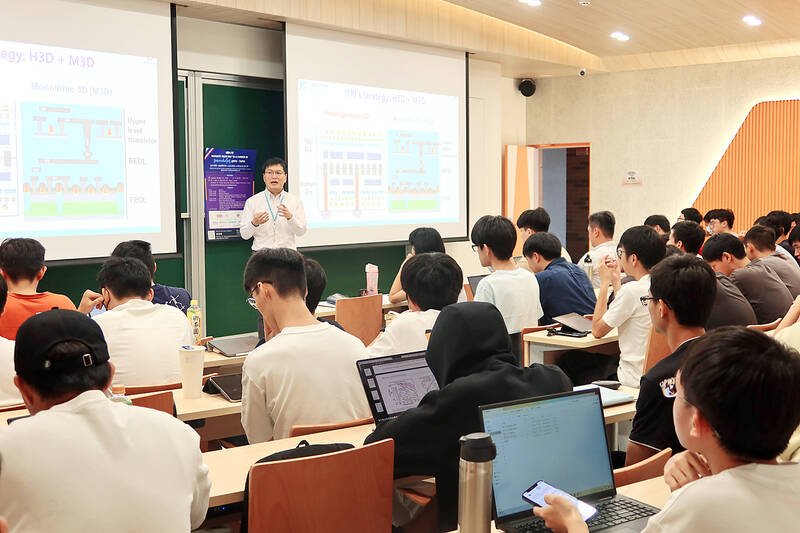National Taiwan University (NTU) remained Taiwan’s top-ranked institution in the latest Quacquarelli Symonds (QS) 2025 Asia University Rankings, despite dropping five places from the previous year.
NTU and Universiti Kebangsaan Malaysia, which each earned 85.5 points, were tied for 26th place in the rankings released on Wednesday.
Seven other domestic universities made it into the top 100, including National Tsing Hua University in 39th, National Cheng Kung University in 41st and National Yang Ming Chiao Tung University in 42nd.

Photo courtesy of National Taiwan University
NTU fell from 21st in the 2024 rankings released last year, marking its first drop after peaking at 19th from the 2021 to 2023 lists.
National Yang Ming Chiao Tung University, which moved up five places from 47th in the previous rankings, was the only Taiwanese university in the top 50 to make progress.
Its 42nd placing marks the university’s best result in its four-year history.
The other local universities ranked in the top 100 were National Taiwan University of Science and Technology (66th), National Taiwan Normal University (79th), National Sun Yat-sen University (83rd) and National Taipei University of Technology (91st).
NTU scored highest among Taiwanese universities in the “Academic Reputation” and “Employer Reputation” categories, which account for 30 percent and 20 percent of the overall score respectively.
National Tsing Hua University and National Cheng Kung University also ranked in the top 50 in Asia for the two metrics, while National Yang Ming Chiao Tung University ranked in the top 50 for employer reputation.
QS’ 2025 rankings, the 16th edition of the report, featured 984 universities from 25 countries and territories across Asia.
Of the 48 Taiwanese universities on the list, 17 rose in the rankings, 16 fell, 13 remained unchanged and two made their debut.
Taiwanese universities have a strong reputation among employers and academics, but face challenges from regional peers in research output and impact, QS senior vice president Ben Sowter said.
The country’s declining student enrollment, driven by demographic shifts, is also placing additional pressure on many institutions, Sowter said.
The government has increased funding to support students at private universities and invested more in science, technology, engineering and mathematics research, although the effect of the efforts remains to be seen, he said.
Five Taiwanese universities ranked from 101st and 200th: National Central University (112th), National Chung Hsing University (120th), Taipei Medical University (122nd), National Chengchi University (123rd) and National Chung Cheng University (189th).
The top four universities on the list remained unchanged from the previous edition, with Peking University, the University of Hong Kong, National University of Singapore and Nanyang Technological University continuing to top the list in that order.
Peking University has dominated the rankings for three consecutive years with a perfect score of 100.
Rounding out the top 10 from fifth to 10th were Fudan University, the Chinese University of Hong Kong, Tsinghua University in China, Zhejiang University, Yonsei University in South Korea and the City University of Hong Kong in that order.
With the exception of the City University of Hong Kong, which rose from 17th place last year, the other top nine universities were ranked in the top 10 in the rankings for 2024.
The QS rankings were first issued in 2004 in conjunction with Times Higher Education (THE) before QS and THE parted ways in 2009 and started producing separate university rankings.

POSITIVE DEVELOPMENT: Japan and the US are expected to hold in-depth discussions on Taiwan-related issues during the meeting next month, Japanese sources said The holding of a Japan-US leaders’ meeting ahead of US President Donald Trump’s visit to China is positive news for Taiwan, former Japan-Taiwan Exchange Association representative Hiroyasu Izumi said yesterday. After the Liberal Democratic Party’s landslide victory in Japan’s House of Representatives election, Japanese Prime Minister Sanae Takaichi is scheduled to visit the US next month, where she is to meet with Trump ahead of the US president’s planned visit to China from March 31 to April 2 for a meeting with Chinese President Xi Jinping (習近平). Japan and the US are expected to hold in-depth discussions on Taiwan-related issues during the

‘LIKE-MINDED PARTNER’: Tako van Popta said it would be inappropriate to delay signing the deal with Taiwan because of China, adding he would promote the issue Canadian senators have stressed Taiwan’s importance for international trade and expressed enthusiasm for ensuring the Taiwan-Canada trade cooperation framework agreement is implemented this year. Representative to Canada Harry Tseng (曾厚仁) in an interview with the Central News Agency (CNA) said he was increasingly uneasy about Ottawa’s delays in signing the agreement, especially as Ottawa has warmed toward Beijing. There are “no negotiations left. Not only [is it] initialed, we have three versions of the text ready: English, French and Mandarin,” Tseng said. “That tells you how close we are to the final signature.” Tseng said that he hoped Canadian Prime Minister Mark Carney

President William Lai (賴清德) yesterday bestowed one of Taiwan’s highest honors on Saint Vincent and the Grenadines (SVG) Ambassador Andrea Clare Bowman in recognition of her contributions to bilateral ties. “By conferring the Order of Brilliant Star with Grand Cordon on Ambassador Bowman today, I want to sincerely thank her, on behalf of the Taiwanese people, for her outstanding contribution to deepening diplomatic ties between Taiwan and SVG,” Lai said at a ceremony held at the Presidential Office in Taipei. He noted that Bowman became SVG’s first ambassador to Taiwan in 2019 and

A man walks past elementary school artworks at the Taipei Lantern Festival in Ximen District yesterday, the first day of the event. The festival is to run from 5pm to 10pm through March 15.